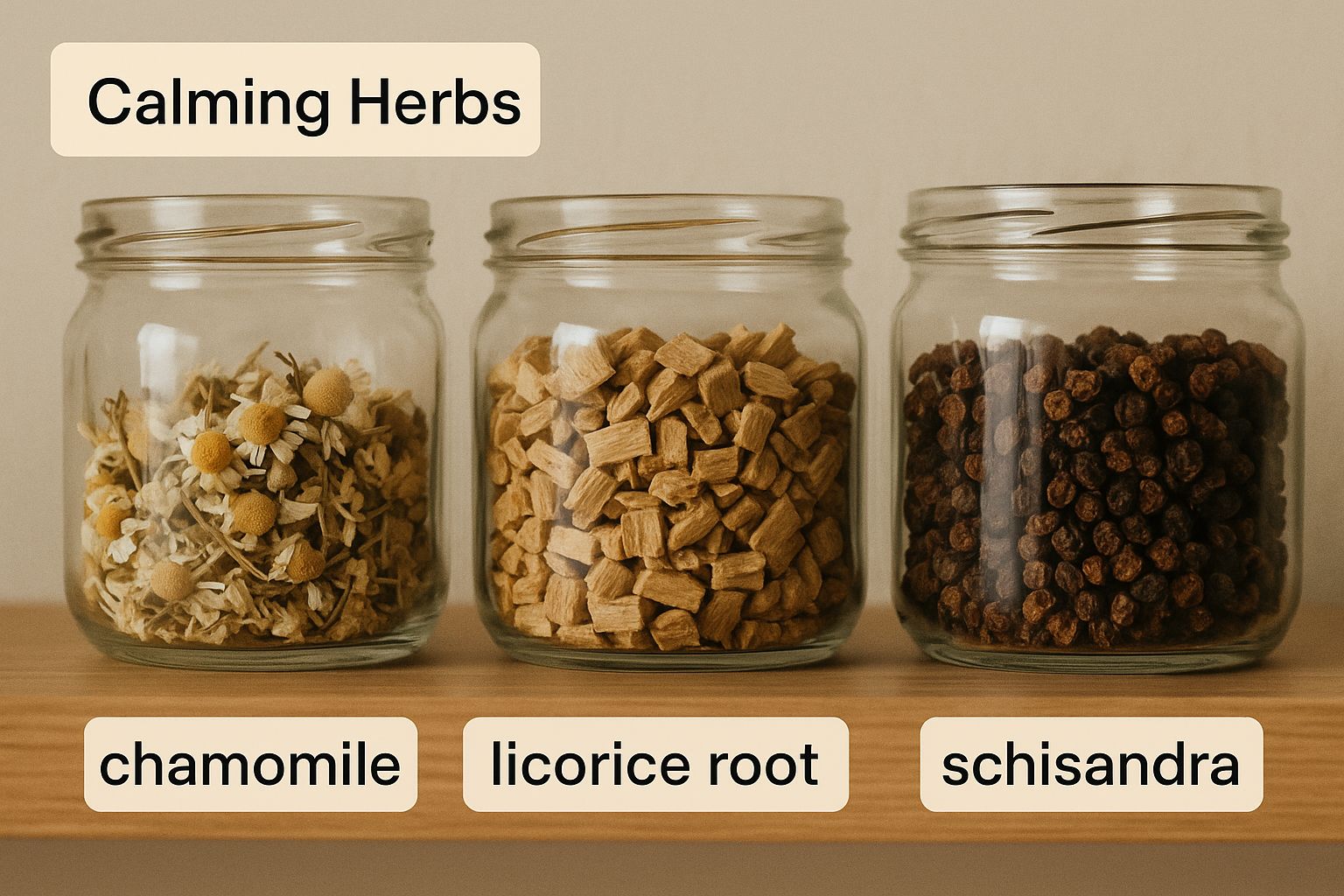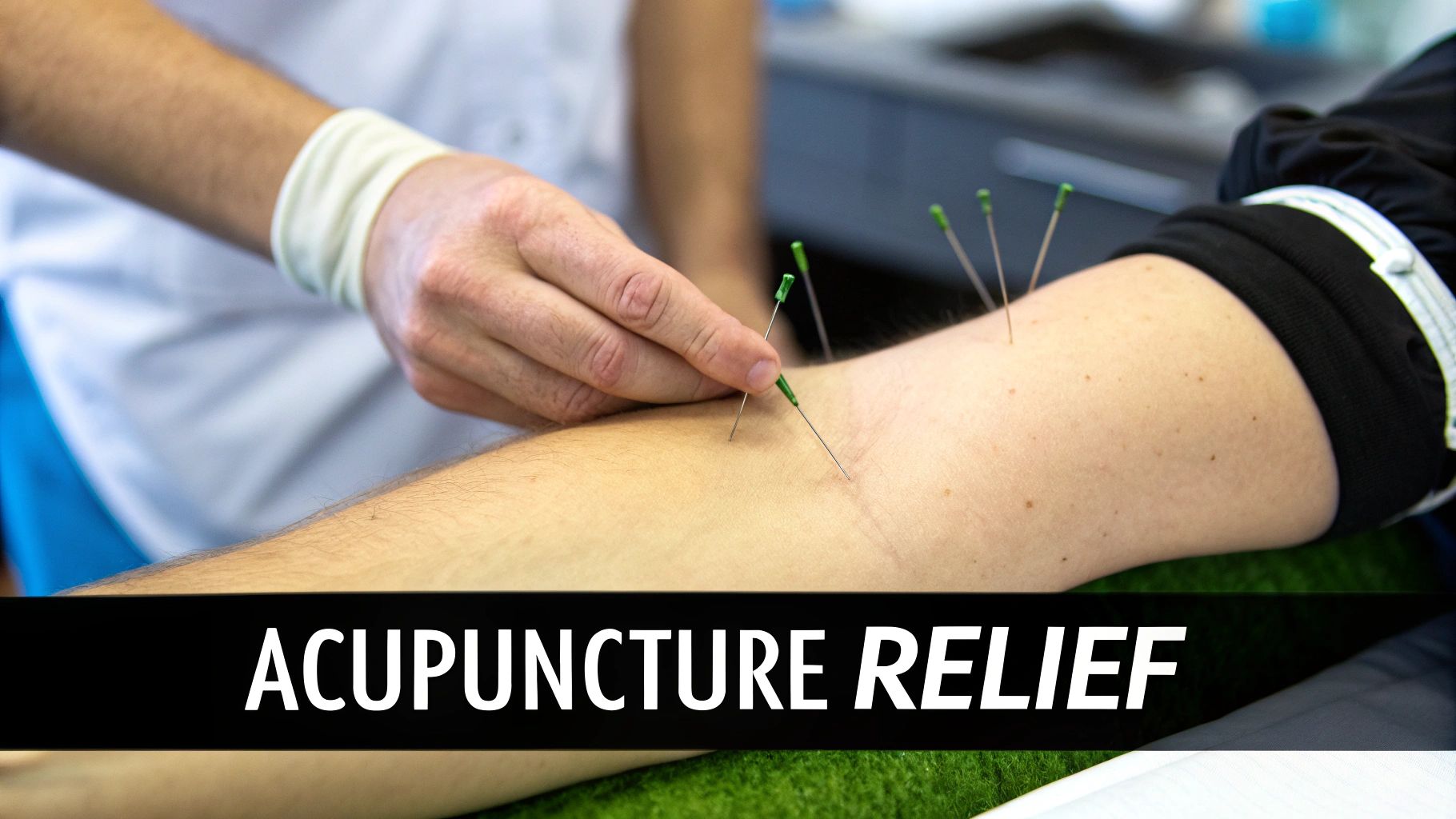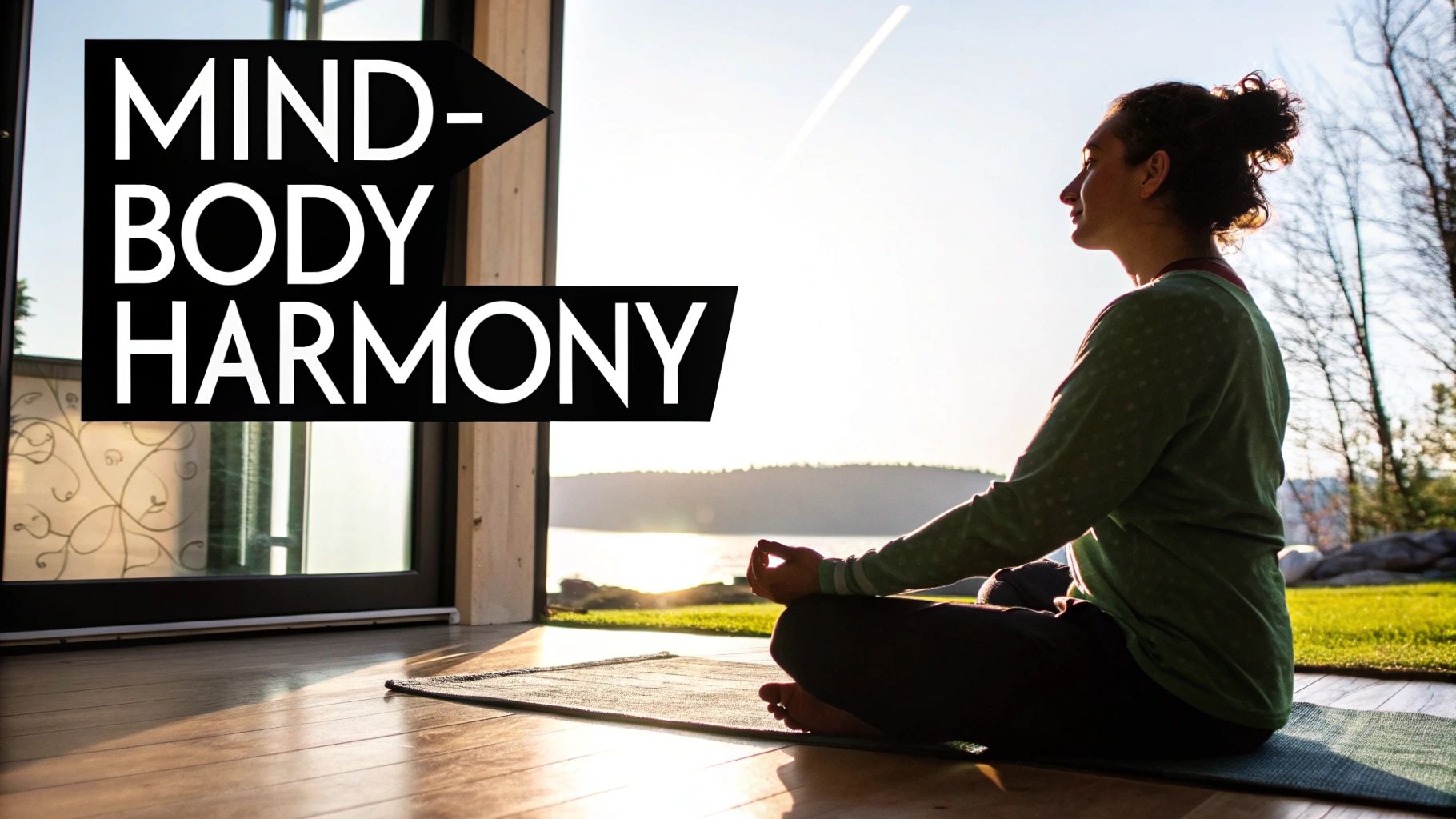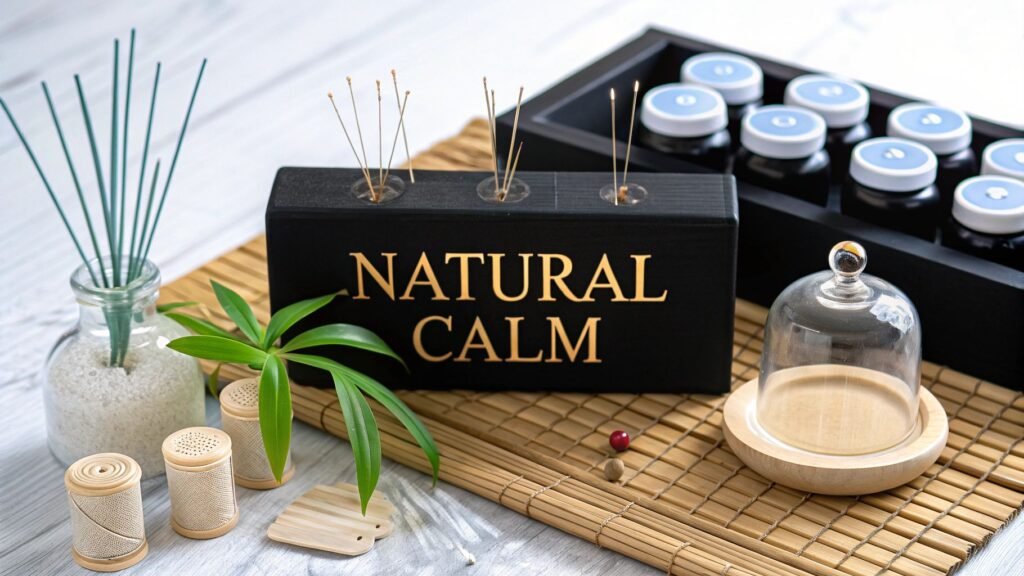When you're struggling with anxiety, it can feel like your mind and body are at war with each other. Traditional Chinese Medicine (TCM) offers a unique path to peace, one that looks deeper than just the anxious thoughts. It treats anxiety not as an isolated problem in your head, but as a clear signal that your body's entire system is out of balance.
At the heart of TCM is the concept of Qi (pronounced "chee"), your body's vital life force. When your Qi is flowing smoothly, you feel healthy and calm. But when it gets stuck or becomes depleted, you might experience things like anxiety, panic, or constant worry. The goal of TCM isn't just to silence the noise; it's to find where the energy is blocked and restore harmony from the inside out.
A Whole-Body View of Anxiety
If you feel like you've tried everything for anxiety with limited success, TCM offers a refreshingly different perspective. It doesn't see anxiety as a flaw, but more like a check-engine light on your car's dashboard—it's a helpful warning that something needs attention under the hood.
This ancient healing system uses time-tested tools like acupuncture, herbal medicine, and specific lifestyle guidance to get to the root of the problem. Instead of just putting a piece of tape over the warning light, TCM aims to fix the engine itself. This patient, holistic approach often leads to profound and lasting improvements in your overall sense of well-being. By exploring these methods, you're not just managing symptoms; you're starting a journey toward genuine, sustainable relief. You might also find it useful to explore other tips on how to reduce anxiety naturally.
A Growing Shift Toward Holistic Healing
This idea of treating the whole person isn't just an ancient philosophy; it's gaining serious traction around the world. People are increasingly looking for more than just a quick fix, and the global market for Traditional Chinese Medicine reflects this growing demand for complementary, whole-body therapies.
The TCM market was recently valued at US$33.3 billion and is expected to grow to US$47.8 billion by 2032. This significant growth signals a major cultural shift toward natural and comprehensive treatments for chronic health issues like anxiety. You can read more about this growing market on PersistenceMarketResearch.com.
This rising acceptance shows just how much value people are finding in applying these ancient practices to modern problems. By focusing on the root cause, TCM provides a powerful framework not just for managing anxiety, but for cultivating true, deep-seated wellness.
How TCM Understands Anxiety and Imbalance
In the world of Traditional Chinese Medicine (TCM), anxiety isn't just a brain problem. It’s seen as a signal—a very meaningful one—that points to a deeper imbalance somewhere in your body's interconnected network. Those feelings of worry, panic, or constant unease are really just the surface-level symptoms of a disruption in your vital energy and the harmony of your spirit.
To really get this, we have to talk about two core ideas: Qi and Shen. The easiest way to think of Qi (pronounced "chee") is as your body's life force. It's the invisible energy that powers everything you do, from breathing and digesting to thinking and feeling. Shen, on the other hand, is your spirit or consciousness. TCM teaches that it resides in the Heart and is the seat of your thoughts, emotions, and mental clarity. When your Qi is flowing freely and your Shen is calm and anchored, you feel grounded and at peace. Anxiety is what happens when this delicate balance gets thrown off.
The Energetic Roots of Your Emotions
A TCM practitioner isn't looking for a chemical imbalance to explain your anxiety. Instead, they're searching for specific patterns of disharmony that show up as anxiety. In this system, your emotions and your physical body are two sides of the same coin; what you feel emotionally is a direct mirror of what’s happening energetically inside your organ systems, especially the Heart, Liver, and Spleen.
Picture your Qi as the traffic flowing through a city. When the roads are clear, everything runs smoothly. But if there’s an accident or a roadblock, you get a massive traffic jam. In TCM, this energy jam is a classic pattern called Liver Qi Stagnation.
This is one of the most common patterns we see tied to modern-day stress, frustration, and bottled-up emotions. The energetic gridlock creates tension, irritability, and a feeling of being "stuck"—all hallmarks of anxiety.
The image below gives you a sense of how we use natural elements, like specific herbs, to gently untangle these knots and restore calm.

As you can see, the focus is on using targeted, natural remedies to soothe the entire system, not just mask a single symptom.
Common TCM Patterns of Anxiety
Anxiety isn't a one-size-fits-all diagnosis in TCM. Your unique emotional and physical symptoms tell a story about where the imbalance lies. The table below outlines some of the most common diagnostic patterns we see in practice.
| TCM Pattern | Associated Emotions | Common Physical Symptoms |
|---|---|---|
| Heart Shen Disturbance | Nervousness, racing thoughts, easily startled | Palpitations, insomnia, vivid dreaming, poor memory, mental fog |
| Liver Qi Stagnation | Irritability, frustration, feeling "stuck" or tense | Chest tightness, sighing, digestive upset, headaches, PMS |
| Spleen Qi Deficiency | Overthinking, worry, obsessive thoughts | Fatigue, bloating, poor appetite, loose stools, muscle weakness |
| Kidney & Heart Disharmony | Deep-seated fear, panic attacks, existential dread | Night sweats, dizziness, ringing in the ears (tinnitus), lower back pain |
Recognizing these patterns helps a practitioner move beyond the simple label of "anxiety" and tailor a treatment that addresses the true root of the problem.
When the Spirit Is Unsettled
Another major cause of anxiety from a TCM perspective is when the Shen gets disturbed. Your Shen needs a calm, well-nourished home in the Heart to feel safe and secure. If the Heart's energy becomes weak or agitated by things like shock, trauma, or chronic stress, the Shen has nowhere to anchor. It becomes restless and ungrounded. This pattern is known as a Heart Shen Disturbance.
I often tell my patients to think of their Shen as a candle flame. In a quiet room with no drafts, the flame is steady, bright, and calm. But if a strong wind suddenly blows through, the flame flickers wildly and threatens to go out. That’s what a disturbed Shen feels like. It shows up as:
- Restlessness and Agitation: A constant, jittery feeling of unease where you just can't settle down.
- Insomnia: A racing mind that prevents you from falling asleep, or waking up startled in the middle of the night.
- Heart Palpitations: A physical sensation of a fluttering, pounding, or skipping heartbeat.
- Mental Fogginess: The inability to think clearly or focus your thoughts.
Ultimately, using traditional Chinese medicine for anxiety isn't about suppressing a symptom. It’s about listening to what your body is trying to tell you. Your anxiety isn't a flaw to be silenced; it's a profound communication asking for attention and care. The goal is always to find that specific pattern of imbalance and gently guide your entire system back to its natural state of equilibrium.
Core TCM Therapies for Soothing Anxiety

Once a TCM practitioner has pinpointed the specific imbalance driving your anxiety, they can draw from a powerful toolkit of therapies. The goal isn't just to treat symptoms but to restore your body's natural state of balance and calm. These aren't passive treatments; they're active interventions that work with your body's own healing intelligence.
Each therapy comes at the problem from a slightly different angle, creating a comprehensive approach to wellness that addresses the root cause of your distress.
Acupuncture: Unlocking Your Body’s Calm
Acupuncture is arguably the most well-known therapy when it comes to using traditional chinese medicine for anxiety, and for good reason. It involves placing sterile, hair-thin needles at very specific points on the body. It helps to think of these points as gateways to your body's energetic network. By stimulating them, a practitioner can clear out blockages, replenish depleted energy, and soothe an unsettled mind, or Shen.
For many, the experience is profoundly relaxing. If you’re dealing with Liver Qi Stagnation, for instance, an acupuncture session can feel like a pressure-release valve, allowing all that pent-up tension and frustration to finally dissipate. For someone whose Heart Shen is disturbed, it can feel like being gently grounded, helping the spirit feel safe and anchored again.
This isn’t just about moving Qi, though. Modern research shows that acupuncture has a direct effect on the nervous system, helping to shift your body out of that anxious "fight-or-flight" mode. It also prompts the brain to release endorphins—your body’s own natural mood-lifters.
This creates a wonderful positive feedback loop. As your nervous system settles, your muscles unwind, your breathing slows and deepens, and your mind feels clearer. It's a physical process that produces tangible mental and emotional relief. You can learn more about how acupuncture helps with stress management in our detailed guide.
Chinese Herbal Medicine: Nourishing From Within
While acupuncture works on your energy from the outside, Chinese herbal medicine offers deep, internal support. An herbalist will prescribe a specific formula—a carefully constructed blend of herbs that work together to correct your particular pattern of imbalance.
These are not simple, one-size-fits-all remedies. Each formula is a sophisticated prescription customized just for you.
- For Liver Qi Stagnation: A classic formula like Xiao Yao San (often called "Free and Easy Wanderer") is a go-to. It contains herbs that gently move stagnant Liver Qi, helping to smooth out irritability and that feeling of being emotionally stuck.
- For Heart Shen Disturbance: You might see a formula with herbs like Ziziphus seed (Suan Zao Ren). It's famous for its ability to nourish the Heart and calm the Shen, making it fantastic for the kind of anxiety that keeps you up at night.
These herbs essentially provide the raw materials your body needs to rebuild its reserves and maintain equilibrium over the long haul.
A licensed herbalist carefully selects and adjusts each formula as your condition improves. This personalized approach is what makes it so effective—it evolves with you.
Supportive Therapies for Physical and Energetic Release
Beyond acupuncture and herbs, your practitioner might bring in other hands-on therapies to support your healing. These methods are brilliant for tackling the physical tension and tightness that almost always come along with anxiety.
Common Supportive Therapies:
| Therapy | How It Helps Soothe Anxiety |
|---|---|
| Cupping | Uses suction to lift tight fascia and muscle, drawing stagnant blood to the surface. It offers incredible relief for the neck and shoulder tension that builds up from chronic stress. |
| Tui Na | A form of Chinese medical massage. Practitioners use specific hand techniques to open energetic channels, move Qi, and relax the body, directly easing the physical symptoms of anxiety. |
These therapies are rarely used on their own. Instead, they are woven into a complete treatment plan that addresses your anxiety from every angle—energetically, chemically, and physically. By combining these methods, a TCM practitioner can help you gently untangle the complex knots of anxiety and guide you back to a more peaceful, grounded state of being.
Key Acupuncture Points and Herbs for a Calm Mind
While TCM therapies like acupuncture and herbal medicine are designed to treat the whole person, their real power comes from their precision. A seasoned practitioner doesn’t just throw a generic "anxiety" treatment at you. Instead, they carefully select specific points and herbs to address the unique energetic imbalance causing your symptoms. This is where the art and science of using traditional chinese medicine for anxiety truly come to life.
Let’s pull back the curtain on some of the most trusted tools a practitioner uses to calm a restless mind and ground an unsettled spirit.
Powerful Acupuncture Points for Anxiety Relief
An acupuncturist has hundreds of points at their disposal, but a few are legendary for their ability to soothe the nervous system and bring about a near-instant sense of calm. You can think of them as master switches for tranquility.
-
Yin Tang (Hall of Impression): Found right between the eyebrows, this is one of the most direct and powerful points for quieting the mind. Stimulating Yin Tang helps to silence racing thoughts, ease worry, and dissolve the mental tension that so often collects in the forehead. Many people report feeling a wave of relaxation almost as soon as the needle is placed.
-
Heart 7 – Shen Men (Spirit Gate): Located along the crease of the wrist, Shen Men is a crucial point for any condition that unsettles the Shen (your spirit or consciousness). It works by directly nourishing the Heart’s energy, which helps anchor the spirit. This makes it incredibly effective for reducing palpitations, insomnia, and that frantic, untethered feeling that anxiety can create.
-
Pericardium 6 – Nei Guan (Inner Pass): Situated on the inner forearm, this point is a superstar for calming the chest and settling the stomach. It's the go-to point for managing the physical sensations of anxiety—things like chest tightness, nausea, and shortness of breath—making it invaluable during panic attacks.
Key Herbs to Soothe an Anxious Mind
Just like acupuncture points, individual herbs have distinct "personalities" and functions. A practitioner will almost always combine several into a balanced, synergistic formula, but understanding the star players gives you a real appreciation for how these blends work.
The role of TCM in mental health is gaining serious traction. A study with 1,343 participants found that 32.8% were dealing with anxiety symptoms, and 9.9% faced severe anxiety. The research highlighted that TCM therapies can significantly help ease these symptoms and improve overall quality of life. You can explore the research into TCM and anxiety management for more details.
Here are a couple of the powerhouse herbs your practitioner might turn to:
Ziziphus Seed (Suan Zao Ren)
This is the quintessential herb for anxiety that sabotages your sleep. It works by deeply nourishing the Heart and Liver blood, which essentially creates a safe and comfortable "home" for your Shen to rest in at night. If your anxiety shows up as a racing mind that keeps you from falling or staying asleep, Suan Zao Ren will likely be a cornerstone of your formula.
Bupleurum Root (Chai Hu)
Picture the feeling of being stuck in a traffic jam—that simmering frustration and tension is a perfect metaphor for Liver Qi Stagnation. Chai Hu is the premier herb for breaking up that energetic gridlock. It doesn't just sedate you; it actively smooths the flow of Qi throughout your body, relieving the irritability, frequent sighing, and pent-up emotions that often come with stress-induced anxiety.
This is the beauty of the TCM approach. By weaving together specific points and herbs, a practitioner crafts a highly personalized treatment that speaks directly to your body's needs, helping it find its way back to balance.
Bringing TCM Principles into Your Daily Life

While professional treatments like acupuncture and herbal formulas are pillars of TCM, the real magic happens when you weave these ancient principles into your daily habits. This is where you can truly amplify the benefits of your treatments and build lasting resilience against anxiety, starting the moment you wake up. The idea isn't to add more stress to your life, but to make small, supportive shifts that become a natural part of your routine.
Think of it as extending the healing process beyond the clinic walls and into your own home. By aligning your daily schedule and even your kitchen with your body’s unique needs, you create a powerful foundation of balance that makes you far less vulnerable to the triggers of stress and worry. It’s all about taking consistent, mindful steps that nurture your energy and calm your spirit.
Mindful Eating for a Calm Spirit
In TCM, food isn't just fuel; it's medicine. What you eat has a direct and profound impact on your Qi, and it can either aggravate anxiety or help soothe it. Let's take a common example: anxiety that comes from what we call "Spleen Qi Deficiency." This pattern is often tied to a cycle of overthinking and worry, where the digestive system is seen as energetically weak.
If you’re dealing with this, starting your day with a cold smoothie or a raw salad might feel healthy, but in TCM terms, it's like asking a tired system to do heavy lifting. It can tax your digestive energy even further. A much better choice would be a warm, nourishing breakfast like oatmeal or congee—a simple rice porridge. These foods gently build and protect your Spleen Qi, which in turn helps foster mental clarity and a sense of stability that can carry you through the day.
Making simple dietary shifts is one of the most accessible ways to practice traditional chinese medicine for anxiety. It’s not about restrictive dieting, but about consciously choosing foods that energetically support your specific constitution.
Movement for Harmonizing Energy
Beyond what’s on your plate, certain mind-body practices are exceptional tools for managing anxiety because they’re designed specifically to harmonize your body's energy. These gentle movements are fantastic for releasing stagnant Qi—that feeling of being "stuck"—and calming an overactive nervous system.
Two of the most effective practices are:
- Qigong: This practice involves a series of slow, flowing movements synchronized with deep, intentional breathing and a meditative focus. Many Qigong routines are tailored to support specific organ systems, helping to clear energetic blockages and restore a feeling of deep calm.
- Tai Chi: Often beautifully described as "meditation in motion," Tai Chi blends gentle physical movements with mindfulness. It's renowned for improving physical balance while cultivating a profound sense of inner peace.
It's no surprise that these practices are gaining traction worldwide. In fact, North America now accounts for a staggering 39.5% of the total revenue share in the global TCM market. This growth is largely fueled by people seeking out exactly these kinds of holistic, patient-centered approaches. You can learn more about the rise of TCM in Western healthcare on Market.us.
By integrating these simple habits into your life, you provide your body with continuous support, reinforcing the balance you work to achieve during your treatments.
Answering Your Questions About TCM for Anxiety
It’s completely normal to have questions when you’re thinking about a new path to health. Exploring traditional chinese medicine for anxiety can bring up a mix of hope and uncertainty. My goal here is to clear things up, addressing the most common questions I hear from patients so you can feel more confident and informed.
We'll walk through what to expect in terms of timing, what the treatments actually feel like, and how to find a professional you can trust.
How Long Does It Take to See Results for Anxiety?
The timeline for feeling better with TCM is different for everyone—it’s as individual as you are. Some people tell me they feel a wave of calm or relaxation right after their very first acupuncture session, which is fantastic. But creating deep, lasting change takes time and consistency.
For more persistent, chronic anxiety, you can generally expect to see noticeable shifts in related areas—like better sleep, smoother digestion, or a more stable mood—within 4 to 6 weekly treatments. Getting to the root of the imbalance, however, often requires a commitment of a few months. This consistent approach, combining both acupuncture and herbal medicine, is what builds significant, stable results that truly last.
Is Acupuncture for Anxiety Painful?
Let me put your mind at ease: acupuncture shouldn't hurt. The needles we use are incredibly fine, about the thickness of a human hair. They’re a world away from the hypodermic needles used for shots or blood draws.
When a needle is inserted, you might feel a quick, tiny pinch, but it’s often followed by a unique sensation—maybe a dull ache, a feeling of heaviness, or a gentle tingle at the point. This is what we call de qi (pronounced "duh-chee"), and it’s actually a good thing! It means your body's energy is engaging with the treatment. In fact, many people find the experience so deeply relaxing they drift off to sleep right on the treatment table. A skilled practitioner will always make your comfort their top priority.
Can I Use TCM With My Current Medications?
Absolutely. TCM is very often used as a complementary therapy alongside conventional medications for anxiety. The key here is open communication with all of your healthcare providers. It’s crucial that both your medical doctor and your TCM practitioner know about every single treatment and medication you are taking.
A well-trained TCM practitioner will know exactly how to choose acupuncture points and herbal formulas that are not only safe but also work synergistically with your prescriptions. And just to be clear: never change your dosage or stop taking a prescribed medication without talking to the doctor who prescribed it first.
How Do I Find a Qualified TCM Practitioner?
Finding the right person to guide you is probably the most important step you'll take. When you're looking for a practitioner, keep an eye out for essential credentials like L.Ac. (Licensed Acupuncturist) or Dipl. O.M. (Diplomate of Oriental Medicine). These titles aren't just letters; they prove the practitioner has passed demanding national board exams and adheres to high standards for safety and practice.
You can usually check a practitioner's license on your state's official licensing board website or through directories from professional organizations like the NCCAOM. I also highly recommend finding someone who has specific experience or a professional focus on mental and emotional health. Their specialized expertise can make all the difference, especially since the imbalances causing anxiety often connect to other issues. You can read more about that connection in our article on acupuncture for chronic fatigue.
Ready to explore a personalized, integrative approach to managing your anxiety? At Eric Tsai Acupuncture and Herbs, we combine deep knowledge of Traditional Chinese Medicine with an understanding of modern health needs to help you find balance. Visit us at https://drerictsai.com to learn more and schedule your consultation.

